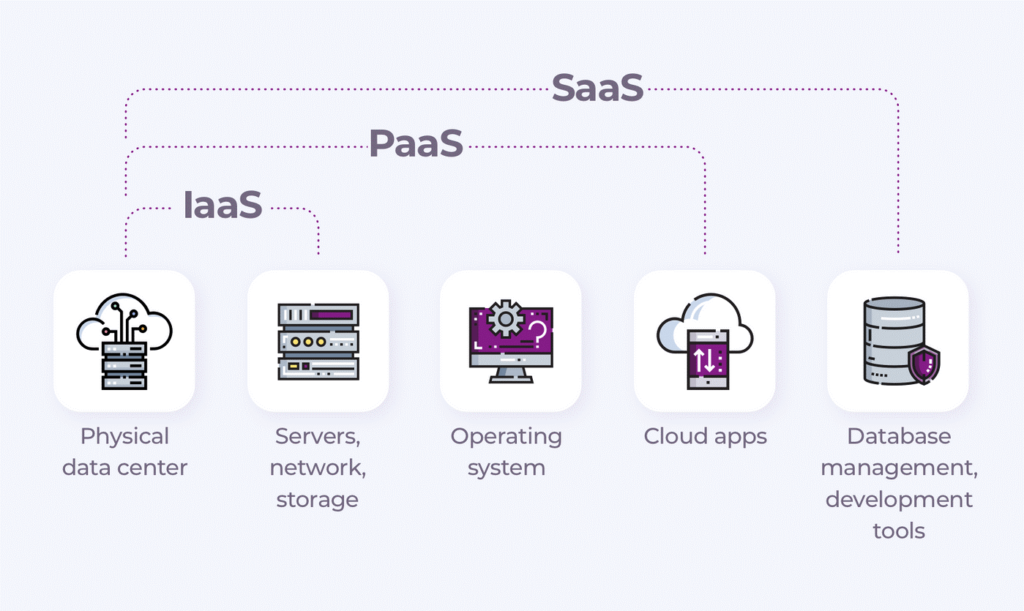The Future Of Cloud Computing In Digital Business
The cloud computing enables companies to be fast, dynamic and flexible – giving your organization the ability to test new projects that are cost-effective and low-risk – allowing you to use technology to meet customer demands quicker
Infrastructure
Cloud Infrastructure
Cloud infrastructure is made up of hardware and software components, each integrated with one another into a single architecture supporting business operations.
Development
Cloud Application Development
A cloud-based software solution makes digital operations more streamlined and provides businesses of any size with greater flexibility.

Cloud
How cloud
can transform businesses?
What is cloud computing enablement?
Cloud enablement is the process of analyzing an organization’s existing landscape, then architecting, deploying and operating a portion of or its entire in-house IT infrastructure, software and resources to either a public, private or hybrid cloud environment. Cloud enablement services are typically delivered by cloud computing solution providers or cloud service providers.
What are the business benefits of cloud computing enablement?
The business benefits of cloud enablement include:
- Cost-effectiveness: A major benefit of switching to cloud computing is cost-effectiveness. Since is hosted over the internet by a third-party, businesses can save large sums of money that would otherwise be spent on hardware equipment, software installation, and maintenance. Pay-as-you-go model allows an organization to pay for only the computing resources it uses.
- Scalability: Complete control over infrastructure and the ability to scale IT resources up and down depending on business demands.
- Speed of innovation. The agility to respond swiftly to market needs by rolling out new products or services.
- Accessibility: Access to cloud-based applications and data from virtually any device by connecting to the internet.
- High availability: Most cloud providers provide highly reliable services, with up to 99.99% uptime.
- security: One of the key drawbacks of traditional data centers and applications is their vulnerability to cyber attacks. Cloud computing strengthens information security and minimizes a business’ risk by keeping data safe in a virtual, virus-free environment.
What Is a Cloud-Based App?
A cloud-based application is a software solution that runs the processing logic and data storage between two different systems: client-side and server-side.
Cloud-based application development is profitable since most data storage exists on a remote server.

There are three types of cloud-based apps: SaaS, IaaS, and PaaS. Let’s figure out what each of them stands for.
Software as a Service or SaaS
SaaS stands for a cloud solution that can be used via mobile apps and web browsers. Such a service lets customers use the app without installing and configuring it. Thanks to the Internet, you can use SaaS solutions worldwide from any device.
SaaS app development is popular among companies and ordinary users. A SaaS application is software licensed using the Software as a Service business model. Cloud-based web apps are accessible from any device anywhere in the world, which means they don’t need to be physically installed on your computer.
Platform as a Service or PaaS
PaaS offers you to rent everything you need to develop an app, relying on a cloud provider for development tools, infrastructure, and operating systems. Vendors working with this cloud computing model provide software and hardware tools to simplify the development process.
Platform as a Service solutions may include:
- Development tools
- Middleware
- Operating systems
- Database management
- Infrastructure
Infrastructure as a Service or IaaS
- IaaS means that a service provider manages your business’s infrastructure — servers, network, visualization, and storage via a public or private cloud.
- As a business owner, you can access the infrastructure using an API or admin panel. You can also manage operating systems and apps while providers (like AWS, Microsoft Azure, DigitalOcean) give you hardware, networking, hard drives, storage, and servers.
ADOPT
By 2021, 98% of businesses will move to multiple hybrid clouds.
COST
66% of executives from 19 different industries said a multi-cloud strategy is crucial to reducing costs.
IMPACT
74% of Tech Chief Financial Officers say cloud computing had the most measurable impact on their business in 2017.
SECURITY
94% of businesses report significant improvements in online security after moving their data to the cloud.

Create Richer Experiences
We’re helping today’s largest global enterprises become intuitively digital by using the cloud to gain fresh insights, unlock new opportunities and build new models for creating richer customer experiences.
OFFERINGS
FLY ON THE CLOUD
Shaarait offers cloud computing services solutions in Kuwait including cloud planning and assessment cloud migration cloud deployment and integration that align your business needs to help you build a transformative solution for a competitive edge.




